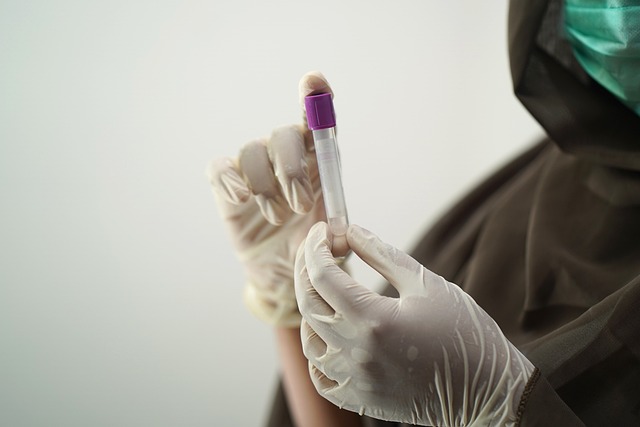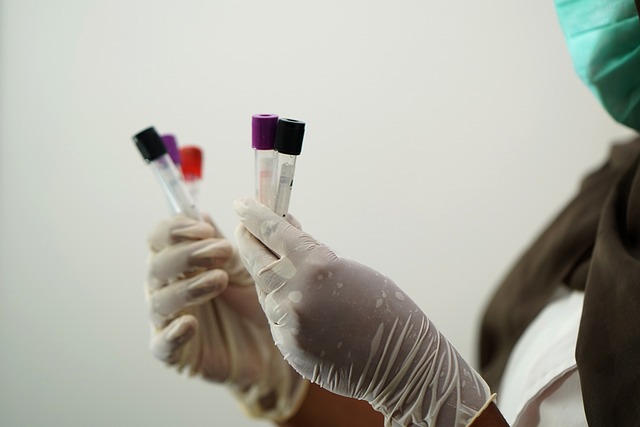The Male Hormone Blood Test UK is a pivotal diagnostic tool for men's health, offering dual benefits by assessing both cardiovascular risk factors such as cholesterol levels (including LDL and HDL cholesterol, as well as triglycerides) and male hormonal health. Given the high incidence of heart and circulatory diseases in the UK, this test is crucial for early detection and intervention. It's a non-invasive procedure that provides insight into an individual's cardiovascular risk profile, enabling timely health improvements through lifestyle changes or medical treatment. The test measures total cholesterol, LDL and HDL cholesterol, triglycerides, and may include hormonal assessments like testosterone levels, which are significant for muscle mass, bone density, sex drive, sperm production, and overall health. The National Institute for Health and Care Excellence (NICE) recommends regular screenings for men over 40 or those at high cardiovascular risk. Understanding the results and discussing them with healthcare providers is essential for informed decision-making regarding lifestyle adjustments, medical treatments, and addressing potential hormonal imbalances that could affect health and well-being. Regular monitoring and follow-ups are integral to managing these risks effectively within the UK's healthcare system.
navigating cholesterol management is pivotal for maintaining cardiovascular health. This article delves into the significance of cholesterol level testing via blood tests, specifically focusing on male hormone blood testing within the UK context. Understanding one’s cholesterol profile is crucial—it can reveal insights into overall health and guide preventive measures. We will explore the process of male hormone blood testing in the UK, ensuring clarity on what to expect during the test. Moreover, interpreting the results opens the door to actionable steps and informed lifestyle changes tailored to the UK’s health standards. This comprehensive guide aims to demystify cholesterol testing for men, empowering them with knowledge to make proactive health decisions.
- Understanding Cholesterol and Its Impact on Health for Men: A Guide to Male Hormone Blood Testing in the UK
- The Process of Male Hormone Blood Testing: What to Expect When Getting Tested for Cholesterol in the UK
- Interpreting Your Male Hormone Blood Test Results: Actionable Steps and Lifestyle Changes Post-Testing in the UK Context
Understanding Cholesterol and Its Impact on Health for Men: A Guide to Male Hormone Blood Testing in the UK

Understanding cholesterol is pivotal for maintaining cardiovascular health, and its impact on men’s health cannot be overstated. Cholesterol is a waxy substance found in the bloodstream; it plays a crucial role in several bodily functions, including hormone production, which is particularly significant for male hormonal balance. However, an imbalance or excessive levels of cholesterol can lead to plaque buildup in the arteries, increasing the risk of heart disease and stroke. In the UK, where heart and circulatory diseases remain a leading cause of death, regular blood testing is recommended to monitor cholesterol levels effectively. Male Hormone Blood Test UK services are specifically tailored to assess both cholesterol levels and male hormonal health simultaneously. These tests measure various lipid components, including LDL (‘bad’) cholesterol, HDL (‘good’) cholesterol, and triglycerides, providing a comprehensive view of an individual’s cardiovascular risk profile.
For men, understanding the interplay between cholesterol levels and hormonal health is essential. Elevated cholesterol can affect testosterone production and vice versa, creating a cycle that can impact overall well-being if left unchecked. The Male Hormone Blood Test UK is an accessible healthcare tool designed to empower men with knowledge about their health status. It enables early detection and intervention, which are key to preventing the onset of cardiovascular diseases. This test is typically conducted through a simple blood draw, offering insights into both cholesterol levels and hormonal imbalances that may be present. By identifying risk factors early, men can take proactive steps to manage their health through lifestyle changes, medication if necessary, and regular monitoring. This proactive approach underscores the importance of routine testing as part of a holistic health strategy for men in the UK.
The Process of Male Hormone Blood Testing: What to Expect When Getting Tested for Cholesterol in the UK

When undergoing a cholesterol test in the UK, specifically targeting male hormonal profiles, it is a straightforward and routine procedure. The process begins with an appointment at a local GP surgery, private clinic, or hospital phlebotomy department. Upon arrival, a healthcare professional will typically perform venous blood sampling, which involves inserting a needle into a vein—usually in the arm—to extract a sufficient volume of blood for analysis. This procedure is conducted to measure various lipid components, including total cholesterol, low-density lipoprotein (LDL) cholesterol, high-density lipoprotein (HDL) cholesterol, and triglycerides.
The test itself is part of a broader health assessment that can also include male hormone levels, particularly testosterone. This is because there is a link between hormonal imbalances and cardiovascular health, as well as overall well-being. In the UK, the National Institute for Health and Care Excellence (NICE) guidelines recommend regular cholesterol screening for men over the age of 40 or those at higher risk of cardiovascular disease. The results from this blood test can inform lifestyle changes or the need for pharmacological interventions to manage cholesterol levels effectively. It is important for individuals to discuss their medical history, potential risks, and interpretation of the test results with their healthcare provider to fully understand the implications of their cholesterol levels and any related male hormone imbalances.
Interpreting Your Male Hormone Blood Test Results: Actionable Steps and Lifestyle Changes Post-Testing in the UK Context

Understanding your male hormone blood test results in the UK is a critical step towards maintaining optimal health. In the UK, the National Health Service (NHS) offers routine checks for male hormone levels as part of general health screenings or when specific symptoms suggest a hormonal imbalance. If your test indicates a deviation from normal ranges, particularly for testosterone, it is imperative to consult with a healthcare provider. Testosterone is pivotal for men’s health, regulating muscle mass, bone density, sex drive, and sperm production, among other functions.
Post-testing, your healthcare provider will discuss the results and recommend actionable steps tailored to your individual needs. If hormone levels are below the normal range, lifestyle changes such as increased physical activity, dietary adjustments to boost testosterone production, and stress management can be effective interventions. Conversely, if levels are high, it may indicate an underlying condition that needs medical attention. Lifestyle modifications might include modifying or reducing certain activities, dietary changes aimed at lowering excess hormone production, and monitoring for potential health issues associated with high male hormones. In both scenarios, regular follow-up appointments are crucial to track your progress and adjust treatment plans as necessary. Additionally, understanding the impact of external factors like obesity, medication use, and environmental toxins on hormone levels can further inform these lifestyle changes, leading to better management of your male hormone health in the UK context.
Regular monitoring of cholesterol levels through male hormone blood testing is a pivotal aspect of maintaining cardiovascular health in the UK. This comprehensive guide has demystified the process and interpretation of such tests, providing clear guidance on what men can expect during the testing procedure and how to understand their results effectively. By embracing this preventative health measure, men can make informed lifestyle adjustments, ultimately reducing their risk of heart disease and its associated complications. The importance of staying proactive with health screenings, like the male hormone blood test available in the UK, cannot be overstated. It empowers individuals to take charge of their well-being and manage their cholesterol levels for a healthier, longer life.
